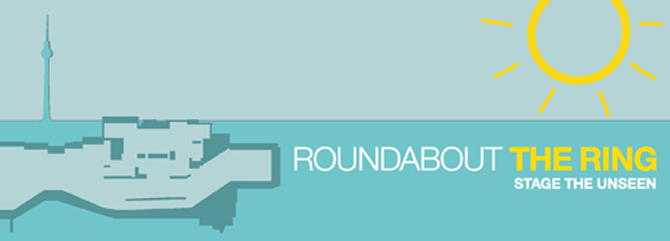Technische Universität Braunschweig and Universidad Diego Portales, Santiago de Chile
16 - 26 September 2013
ROUND ABOUT THE RING
Stage the unseen
In this Design Studio students from the TU Braunschweig (Professors Almut Grüntuch-Ernst and Gabriele G. Kiefer) will be working together with Chilean students from the Universidad Diego Portales, Santiago de Chile (Professors Mathias Klotz, Ricardo Abuauad, Carlos Perez).

The city of Berlin has plenty of spaces, that are misused, forgotten or even unknown; but those spaces represent a huge potential for development. As the city keeps growing, it is important to try to increase density using already existing spaces. How can we make people aware of the massive potential of such residual spaces? Berlin has many examples of such deserted spaces, which are - or have been - temporarily occupied for a few years or just for one evening. This activates the place, leading people to look at it differently and even assigning different or increasing value to it.
At the same time, opera houses in Germany are experiencing financial difficulties given that public spending has been curbed and operas having lost valuable subsidies. This in turn forces opera houses to raise ticket prices in order to keep operational. In that matter, opera houses are innovative, experimenting new avenues to reach larger audiences: examples include open-air stages, opera made by teenagers, underwater opera, etc to name but a few.…
Both aforementioned topics could be mutually beneficial and complementary. Designing opera stages in underutilized spaces may change the perception of such places by its audience and subsequently by the inhabitants of the city itself. A revitalized new place to discover and to experience. In addition, opera performance in underutilized public places may divulge the opera experience to a wider and more cross-social audience. The association of opera with elitist culture may be broken. The city, with all its cross-social inhabitants becomes the stage. The students will have to deal with questions such as: how do I occupy a public space? How can I create a stage? (and what makes a stage?) How do I design a stage to make an opera for all? Which consequences can it have on the place itself?
In this matter, we will investigate underground places in Berlin, which could make interesting "stages". The word “underground” is open for interpretation: "underground" not only means “under the ground”, but it can also be understood as “alternative”.
On the occasion of Richard Wagners anniversary, we offered to work on his masterpiece The Ring. Each group of students could choose a scene from the Rhinegold, for which they will develop a specific stage design, which should interact with the city and its inhabitants and at the same time proposes a new interpretation of this famous opera.
Studio coordinators: Professors Almut Grüntuch-Ernst and Gabriele G. Kiefer with Anne-Laure Gestering and Gunnar Schulz (TU Braunschweig) as well as Professors Mathias Klotz, Ricardo Abuauad and Carlos Perez (Universidad Diego Portales, Santiago de Chile ).

